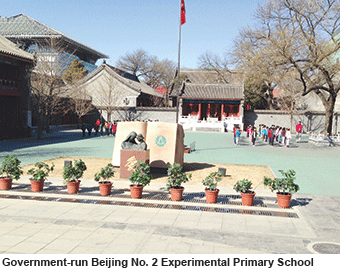 Inside the red-lacquered door of No. 39 Wenhua Lane in central Beijing is an old-style single-storey home built around a small courtyard. Its owner, an elderly man in a vest, sits on an upturned bucket near a jumble of cooking pots; a pile of old cardboard rests atop a nearby shed. Next to the man, two estate agents hover at the entrance to a room just big enough for a bed, a wardrobe and a rickety desk. They say it costs 3.9 million yuan (Rs.3.9 crore). At 353,990 yuan per square metre, this makes it pricier than posh digs around New York’s Central Park — and it doesn’t even have its own bathroom and kitchen. It is, however, close to the state-run Beijing No. 2 Experimental Primary School, one of the best in the city.
Inside the red-lacquered door of No. 39 Wenhua Lane in central Beijing is an old-style single-storey home built around a small courtyard. Its owner, an elderly man in a vest, sits on an upturned bucket near a jumble of cooking pots; a pile of old cardboard rests atop a nearby shed. Next to the man, two estate agents hover at the entrance to a room just big enough for a bed, a wardrobe and a rickety desk. They say it costs 3.9 million yuan (Rs.3.9 crore). At 353,990 yuan per square metre, this makes it pricier than posh digs around New York’s Central Park — and it doesn’t even have its own bathroom and kitchen. It is, however, close to the state-run Beijing No. 2 Experimental Primary School, one of the best in the city.
In March, the ministry of education decreed that by the beginning of the new school year in September, all primary school students and 90 percent in junior secondary schools must attend the school closest to their registered home address (some state agencies will still be allowed to reserve places for children of employees). School managements seem to be taking this latest order more seriously than previous ones.
So too, it seems, are parents. In recent months house prices have been stabilising in most places after a frothy few years, but not near good schools. Now even the most rundown properties in such areas may cost ten times the city average per square metre. The room in Wenhua Lane costs ten times the average. Its lack of cooking or toilet facilities is of little concern to buyers: they would only use the space for “proving” residency, rather than to live in.
The privileges of wealth will thus be preserved. And that suits the best schools just fine, since their status is self-reinforcing. Those able to attract the wealthiest and best-connected — as well as the brightest — are able to recruit the best teachers, and — with the help of parents’ cash — pay for swanky equipment and facilities. (The state turns a blind eye to such glaring inequalities among the schools it runs.) What many parents prize most highly are the connections such schools help their students build; the alumni networks of China’s best state schools are as good at opening doors as those of their private equivalents in Britain (and India).
The authorities in Beijing say they want to level the playing field: posh state schools are being encouraged to share facilities with less well-endowed ones, and to open branches to make access to them easier. “You must trust the government,” says one wealthy mother over espressos at Moi, a Finnish cafe in Beijing. After relying on her family pedigree to get her seven-year-old daughter into the same school as the grandchild of a Chinese leader, she has bought a 5 million yuan (Rs.5.1 crore) apartment in the neighbourhood to assure her toddler son a seat.
(Excerpted and adapted from )